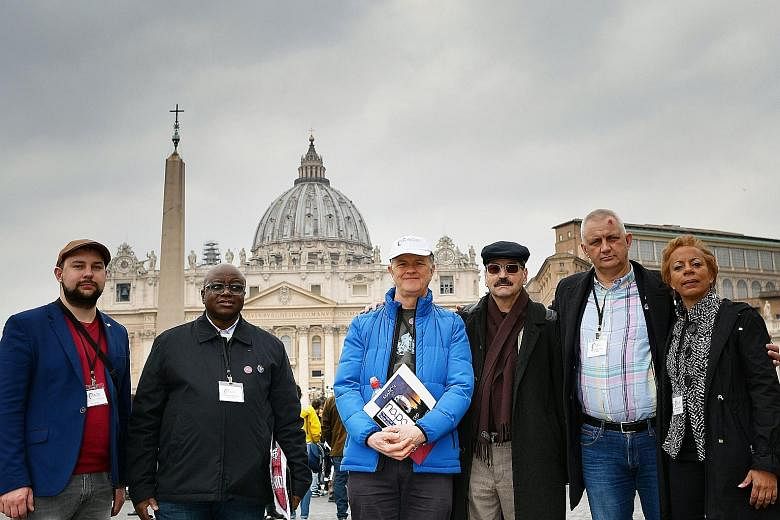PARIS • After years of struggling alone or finding support in national groups, survivors of sex abuse by priests have formed a new global alliance to pressure the Catholic Church to face up to its crimes.
The group, called Ending Clerical Abuse (ECA), brings together activists from dozens of countries on several continents, and will be mobilised in Rome this week when Pope Francis hosts a hotly awaited summit on tackling the wave of child sex abuse scandals shaking the Catholic Church.
"It's a momentous and a historic movement... to bring a global and unified voice," Mr Peter Saunders, one of the group's co-founders, told Agence France-Presse. "This is the first truly global initiative."
Mr Saunders' story is among countless others told by people who grouped together to form ECA last June, including survivors from Chile, Poland, Switzerland, France, Italy, the Democratic Republic of Congo and elsewhere.
"I was abused at seven years old by a family member. I was also sexually abused by two Jesuit priests at my secondary school at about 12 years of age," the Briton said.
The same priest targeted his brother Michael at the same school six years before him, and died aged 55 after a lifelong battle with drug and alcohol abuse.
"I think the church has been resisting change for many, many years and I think at long last the church is beginning to bow to the pressure put on by survivors, by our media colleagues around the world, and by public opinion," he added.
The group's objectives include forcing the church to take a "zero-tolerance" approach to paedophilia, working to overturn the statute of limitations on abuse cases and supporting victims in areas where speaking out remains difficult, such as in various African and Asian countries.
From today to Sunday, ECA will bring together victims in Rome to put new pressure on Pope Francis, who has spoken out strongly over the last two years about abuse in the church after a string of scandals worldwide.
But on the ground, survivors say the culture of secrecy within the Catholic hierarchy and an instinct to cover up abuse cases remain entrenched.
"Either I committed suicide or I spoke out," said a 70-year-old Swiss co-founder of ECA who gives his name only as Jacques. "It was a long and painful fight."
He said a priest raped him continually when he was aged 14 to 20. In 2009, after years of therapy, he contacted the priest who abused him and attempted to reach closure.
Only after a five-year struggle did senior church figures "understand the gravity of the acts of their colleague and accept moral responsibility on behalf of the institution", Jacques said.
As he battled for justice, he also found out that the priest had been identified as a possible paedophile even before he was ordained and had been sent to France several times for "treatment".
In 2010, Jacques founded Sapec, a victims' group in French-speaking Switzerland, which led to the creation of a commission to investigate abuse and oversee compensation for victims.
In Poland, ECA co-founder Marek Lisinski, 50, said he had long dreamed of a new international organisation "to show Polish victims that they are not on their own". He said he was "assaulted for 10 months by a vicar" at age 13 and his search for justice led to a prosecution.
Over several years, he fought dependencies on alcohol and anti-depressants, made three suicide attempts and went through a divorce.
Finally, after nine years of legal proceedings, the vicar was suspended - but just for three years.
"In 2018, the court ordered him to apologise to me, but did not award damages," Mr Lisinski said. "I have never had the apology."
He added: "The church has ignored victims, moves the perpetrators around (from one parish to another) and refuses to meet us despite the instructions from the Pope. Officially it has apologised... but as an institution it has never accepted its responsibility."
AGENCE FRANCE-PRESSE

